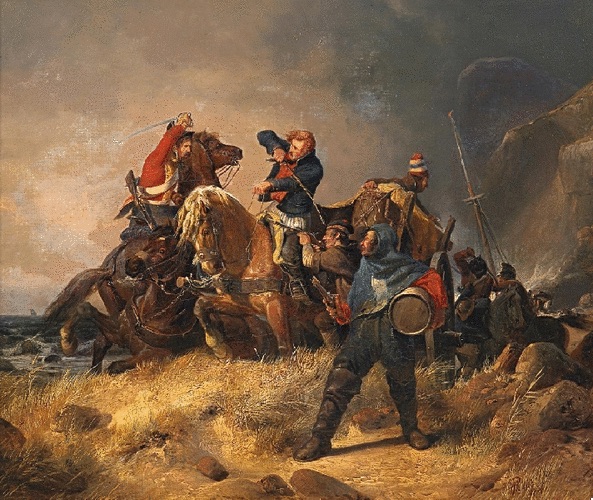
It’s often said that there is nothing new under the sun, and this story from the Stamford Mercury for April 16th, 1772, certainly bears this out. It makes it quite clear that large-scale, organised crime is far from being the invention of the 20th and 21st centuries.
The story concerns the arrest of a man, Edgeley, who is described as the ‘captain’ of an organised group of thieves and smugglers operating along the south coast of England. He, with two of his men, were seized for stealing “a whole wash of wet linen”. At that time, washing clothes and bed linen was undertaken at relatively infrequent intervals, anywhere between monthly and quarterly, simply because of the labour involved. To steal a complete wash therefore implies taking an amount that would fetch a substantial amount of money when sold. Such a theft would incur the death penalty, which may be why one of the accomplices, a man called Brett, decided to turn King’s Evidence.
It was thanks to him that the full story of the activities of the gang came to light. This included murder, piracy and various other crimes. For example, the gang took a boat and disguised themselves as “hovel-men”. These were bands of local fisherman, who would go to the assistance of ships in trouble in return for a share in the salvage value. In East Anglia, they were known as beachmen. A hovel, in this case, is the name of the rowing boat such groups used. The gang’s purpose in this case was either to seize the entire ship with its cargo, or at least carry out a substantial robbery. The ship’s crew however prevented them.
“Another declaration was made, that one night when they went out to a ship, in the characters of hovel-men, to give assistance, the ship’s crew were too numerous and one of the gang was knocked overboard and drowned; the gang consists of twenty, several of whom lived in apparently respectable situations.”
The gang even engaged in counterfeiting, having premises in far-off Birmingham, where they made counterfeit (Spanish) dollars. They used what they made to purchase goods from foreign ships waiting offshore and sell them for sound coinage when they returned.
Posing once again as hovel-men, they regularly offered to ferry ashore passengers arriving by sea:
“In bringing passengers onshore, they were sure, of late, to carry away some part of the baggage: this Harvey, master of the ship, knows who was obliged to pay £70 for the loss of a gentleman’s trunk, which he had assured him was safe.”
What on earth did this “gentleman“ have in his trunk to make it worth £70, I wonder? That’s roughly the equivalent of £14,000 in today’s money!
This was not, however, the worst of their depredations. The article goes on to state how they murdered the whole crew of a Dutch vessel, in order to get hold of a large quantity of beeswax and tallow (for making candles), which they sold nearly a hundred miles away in Winchester. They then scuttled and sank the vessel, though part of it, according to the newspaper, still remained above the water. All in all, their thefts were soon on a near-industrial scale, with the property they plundered being sold all along the south coast of England, from Kent in the east to Land’s End in the extreme west.
Like many of today’s organised criminal gangs, they tried to hide their activities behind a smokescreen of respectability. As the article says:
“An account of their piracies is is sent up to the administration; the magistrates at Dover are at a loss how to act in the affair, since such a number of persons of good credit along the coast seem to be involved; but we hope innocently; some of the magistrates of Bow-Street are to go down, we hear, to investigate the business, which has been of some years standing. Edgeley, the captain, lived in an elegant style at Dover, kept his phaeton, and the best company; his daughter, who is to be pitied, was brought up in every accomplishment, attended all the public assemblies, and in fashions was not exceeded by the first ladies in the town.”
Doesn’t that sound uncannily like a mafia Don or the boss of an international drug cartel to you?



It certainly does, and it seems brutality knows no era!
LikeLiked by 1 person